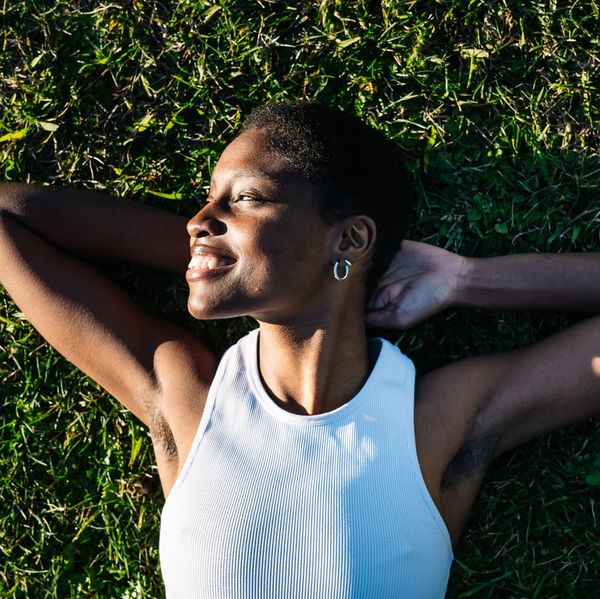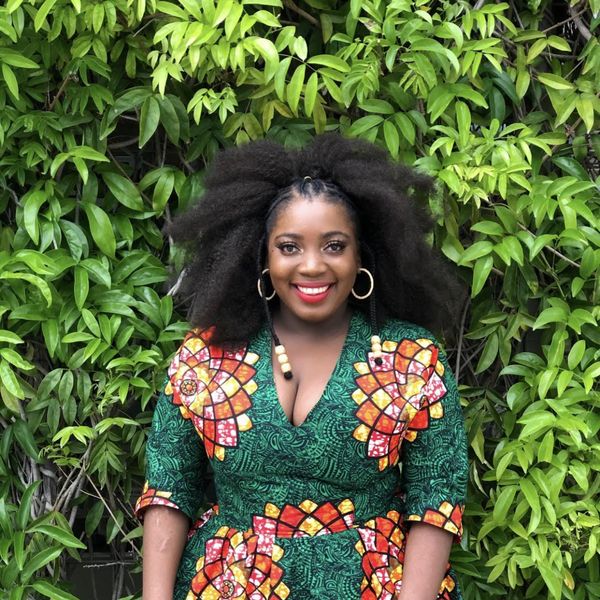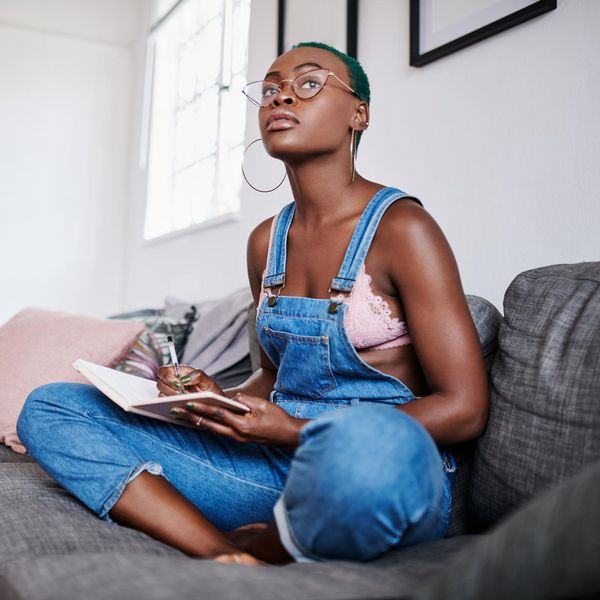Growing up in a Christian household, I was always taught that having a relationship with God is important. I'd see this shown through the examples of immediate family members who were never shy about learning and mastering how to talk to God through prayer. For many, it's a way to relieve stress, usher in blessings, have quiet time, and release mental and spiritual baggage. It is also a vital aspect of being a Christian (as reflected in Philippians 4:6) and allows us to humble ourselves before God (2 Chronicles 7:14), gain wisdom (Daniel 1), and open our hearts for revelations and instructions (Jeremiah 33:3). Whew sis, I know that was a lot of Bible verses, but they are a true indication of why prayer is necessary.
I remember being 11 and reading a book by Judy Blume called "Are You There God? It's Me Margaret." It was an eye-opening exploration of a preteen going through a lot of changes—awaiting her first time menstruating, having her first kiss, understanding her parents' interfaith marriage, and facing peer pressure. I'd known a lot about the church's version of connection with God but this was the first time I could directly relate to developing one on my own terms.
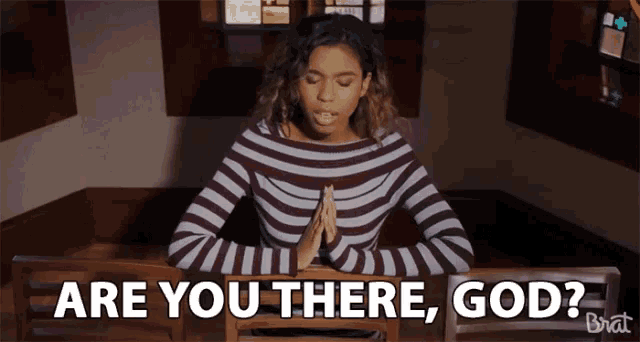
Image via Tenor
Since then, I've seen so many things manifested in my own life through prayer alone, especially during pandemic-related challenges related to finances, employment, and family relationships. Like literally, after I've prayed, issues were either resolved, on the way to being resolved, or didn't bother me as much as they did before I prayed about them. And there are millions of people who pray at least once a day. Many successful leaders can even attest to the power and importance of prayer, from Oprah Winfrey and Beyonce, to Denzel Washington and Chance the Rapper.
You don't have to be perfect, a minister, super-sanctified, or super-educated to pray. All people are welcome to talk to God (1 Timothy 2) and to be blessed by communicating with Him (Matthew 5:6).
If you find yourself stuck on how to talk to God or you need to reconnect, try these 5 steps that have been helpful in my journey:
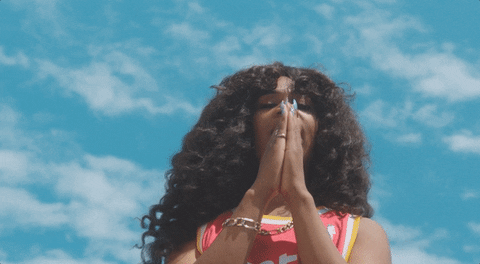
Image via Giphy
1. Talk to God, frankly, about your thoughts—or even doubts—about prayer.
It might seem strange at first, but I've found it helpful to simply go to God as if I'm talking to a trusted loved one. I mean, He is indeed our Father (1 Corinthians 8:6), so why not? You might feel a bit intimidated or silly at first, but go to God and tell him about those feelings. (I still do this. No lie. just the other day I said, "God, I feel super-stupid right now, and I'm mad. Can you please help me to understand and to overcome the anger? Can you help me at least accept and make the necessary changes I need to?)
What's going on in your life? What are you grateful for? What are you confused about? What's bothering you? What would you like to accomplish? Don't get caught up in formalities. (Matthew 6:7 touches on this.)
You can pray with your eyes closed, open, standing, kneeling, quiet, or loudly in a space of your choosing. (I've excused myself at work to go to the bathroom and pray, I've prayed even while someone is speaking to me—especially when I've felt disrespected or "tried" as they say—and I've prayed while in rush-hour traffic, eyes open, of course!) If you feel the urge to kneel, do that. If you need to shout, do that. If you need to cry, let it out. If it's one sentence or a whole hour-long session, that's fine, too. Just have a conversation and be candid. Sit quietly in silence when you can't find the words. You can even write down your thoughts and read those words in your prayer.
If you feel insecure about doing this or think it's not "proper," ask God, "Well, why does 'being proper' matter so much? God, please reveal things to me about the way in which to pray." Take a step forward and God will do the rest.
2. Start with the basics: 'The Lord's Prayer.'
One of the first prayers I learned as a child (other than the usual dinnertime rhyme "God is great, God is good..." ) was "The Lord's Prayer." Jesus offers this prayer in Matthew 6:9-13, and it covers respect of God, forgiveness of others, protection from evil, and coverage of your needs. Throughout my life I've come back to this prayer, and though it might seem a bit formal, it's a go-to for me.
Even at a time where I'd totally turned away from religion and spirituality altogether—and had gotten into some pretty dangerous situations during a dark period of my life that involved a lot of drinking, partying, and tolerating unhealthy abusive relationships—this prayer would be on replay. It was like God had followed me, a phenomenon I'll never forget and will forever be grateful for. It's an empowering prayer, and when I really dig deep into the words and their meaning, I get a sense of boldness and peace.
Other places in the Bible where you can find inspiring and empowering prayers include Psalms 63 (praise), Psalms 51 (forgiveness and redemption), Psalms 30:6-12 (endurance), Psalm 23 ("The Lord is My Shepherd").
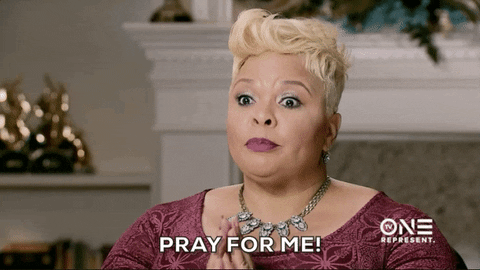
Image via Giphy
3. Read about the prayer practices and experiences of others.
I'm huge on asking God questions and just questioning any notion that is presented to me. It's part of the reason I became a journalist. (Hey, it was either study media or go to law school.) I used to fear that I'd be cursed or sent to hell for questioning God, but then I found out by reading and talking with people who have a balanced relationship with spirituality that being inquisitive and keeping it real with God is not a bad thing. (And just read James 1:5-6 to see what I'm talking about.) My mom, a minister and someone who has a special nuance with counseling women, used to always tell me, "Janell if you have questions or doubts, talk to God about them. Humbly ask him to open your heart and mind. Ask for wisdom. You will get what you ask for."
Gaining a connection with God is a journey, and reading up on spirituality to learn about the experiences of others often provides confirmation or answers to questions I've posed during prayer. Watching videos or listening to podcasts about people's real-life personal stories involving prayer (such as this one featuring author Priscilla Shirer or the "Behind Her Faith" series and podcast) helped me understand and relate more to the practice of prayer. It also helped to read about how someone specifically applies prayer to their process in facing challenges. (Try stories like this one and these.)
4. Join a prayer group or get a prayer partner.
I used to be totally against prayer groups and hotlines because I'd gotten to a point that I preferred prayer alone and in private, but my sister changed my mind on this. I'd noticed the boost in strength, confidence, and comradery she'd find in praying with other women—whether in person or via phone. The Bible even touts the significance of praying with unity with and for others (Matthew 18:19-20 and James 5:14-15). Listen, any effort done in numbers increases in power, and if you're new to praying, it's good to pray with someone who might have a bit more experience, have a special gift for prayer (1 Peter 4:10-11), and who can prepare us to feel at ease to begin praying on our own.
Tap into your network to find believers to pray with, or try a hotline. The Christian Broadcast Network has an awesome prayer line where you can talk to a live person and make requests, and many local churches offer phone or video prayer services. Utilize all of your resources and have patience.
5. Invest in a daily devotional or prayer resource.
To remain connected to prayer and making it a regular part of your life, having devotionals or other resources is a must. I love books like "Starting Your Day Right" by Joyce Meyer, "When Women Pray" by T.D. Jakes, "Fervent: A Woman's Battleground for Serious, Specific, and Strategic Prayer" by Priscilla Shirer, and "Servant Leadership" by J. Oswald Sanders. This women's devotional bible also is a favorite of mine. All of these books provide positive, easy-to-understand insights on faith, prayer, connection with God, and self-reflection.
There are also a few cool apps out there like Abide (which includes affirmations and Bible-based sleep meditation resources) and Echo Prayer (which offers reminders via phone or email and the option to share your favorite prayers with family and friends.) YouTube has some good prayer resources as well, and one I particularly like and consistently listen to is Daily Effective Prayer.
Prayer is personal, dynamic, and essential, and the way you choose to pray evolves along your spiritual journey. I find joy in the process, continue to seek God even when I've fallen off a bit, and strive to do whatever it takes to become stronger and stronger in the practice of it. I hope you will, too.
Are you a member of our insiders squad? Join us in the xoTribe Members Community today!
Featured image by Shutterstock
- 8 Scriptures That Remind Us To Trust In God - xoNecole: Women's ... ›
- LeToya Luckett On The Prayer Of Graditude That Led Her To Her ... ›
- The Power Of The Bible & How It Can Help You Overcome Negative ... ›






